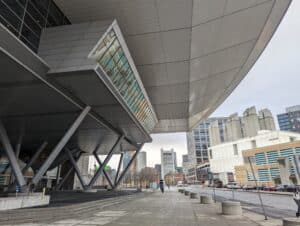
The Boston Convention and Exhibition Center's main entrance on Congress Street. Photo by James Sanna | Banker & Tradesman Staff / file
As Boston competes with other destinations seeking large-scale conventions that bring people and money into cities, the capital’s hotel inventory is among the challenges facing the sector locally.
The convention business, run by a quasi-public state agency, is meant to lift tourism and hospitality sectors in the state, but has hit snags over the past few years with pandemic shutdowns, followed by leadership upheaval amidst alleged mismanagement.
Gov. Maura Healey replaced the majority of the Massachusetts Convention Center Authority board last summer and former authority Executive Director David Gibbons stepped down in November, a year before his contract was set to end. An investigation last fall found the agency fell short on diversity and inclusion efforts and drama escalated surrounding an allegedly opaque process to choose a developer for a valuable piece of state-owned land in South Boston, near the Boston Convention and Exhibition Center.
Now trying to right the ship, board chair Emme Handy, a Healey pick, and interim Executive Director Gloria Larson are taking stock of the state’s three convention hubs.
Milt Herbert, executive director of the Boston Convention Marketing Center – which seeks to market and promote Boston’s two convention centers as well as the Lawn on D outdoor space – told the still-fresh board members on Thursday that the city is short of the number of hotel rooms it needs near the Boston Convention and Exhibition Center.
The BCEC is the largest convention center in New England – nearly three times the size of the Hynes Convention Center in Back Bay.
“We don’t have enough hotel inventory that’s approximate to the BCEC,” Herbert said during a presentation to the board. “We are short compared to most other cities that we usually, typically compete against.”
During “non-peak” times of year, November through March, there’s at most 2,800 rooms available near the BCEC for convention customers, he said. However, customers sometimes seek up to 7,000 rooms – meaning thousands of people have to stay in hotels in other parts of the city.
Hotel rooms are not just scarce, but expensive, Herbert said.
Boston is one of the most expensive cities to hold conventions in, he said, partially driven by hotel prices. Prices drop in the winter months, but that is also when conventions are less frequent.
“If you look at the cities that have overtaken us, every one of them is in the south or Hawaii – in other words all warm weather cities,” he said. “But, you know, we’re regularly dealing with customers into the future where the rate barometer is $350 a night, that’s what our customers are signing contracts for. And San Diego is not saying that. San Francisco is not saying that. Dallas and Houston are not saying that.”
The issue of hotel rooms around the BCEC significant as the board considers new land development near the convention center.
The state-owned land in South Boston, originally taken by eminent domain to boost the convention industry, has been the subject of drama surrounding the MCCA board.
The convention center authority delayed decisions on controversial redevelopment proposals for the land twice in 2023, after allegations surfaced of officials using “false pretenses” to craft the plans and opaque processes in choosing a developer. The board is gearing up to once again try to award a bid to a developer to turn the roughly six acres of currently empty lots into mixed-use developments that could include grocery stores, community space, life science labs – and potentially hotels.
The first time the MCCA board canceled and rejected the redevelopment proposals in April, it was shortly after a handful of politicians objected to the agency’s bidding period – and specifically took issue with the plans for not including mid-priced hotel space.
“These assets were taken by eminent domain for a particular purpose that is not being executed with an open-ended bid offering,” South Boston elected officials wrote to the MCCA board in February. “This has given rise to the concern about the MCCA land banking under false pretenses.”
Among the letter signers was former Boston city councilor Michael Flaherty, who now sits on the MCCA board.
Sen. Nick Collins of South Boston said the plans do not reflect the purpose for which the land was taken in 2012. He said he believed the properties were intended for, and should still be used for, mid-priced hotels to make BCEC more competitive for mid-priced conventions, rather than just luxury events.
When two developers filed new proposals later in 2023, Boston Global Investors had added a hotel to their new plan, which chief executive John Hynes III said would bring the development more in line with the purposes of the original land-taking and would benefit the convention center business in the neighborhood. A rival proposal by Cronin Development would bring 1.32 million square feet of lab and office space for life science tenants, plus a nonprofit art gallery, food hall aimed at incubating entrepreneurs of color, grocery store, film studio and home for the historically Black Pensole Lewis College of Business & Design an outpost in Boston to train future designers in the region’s footwear industries.
The board has not yet chosen a development plan for the land in South Boston.






